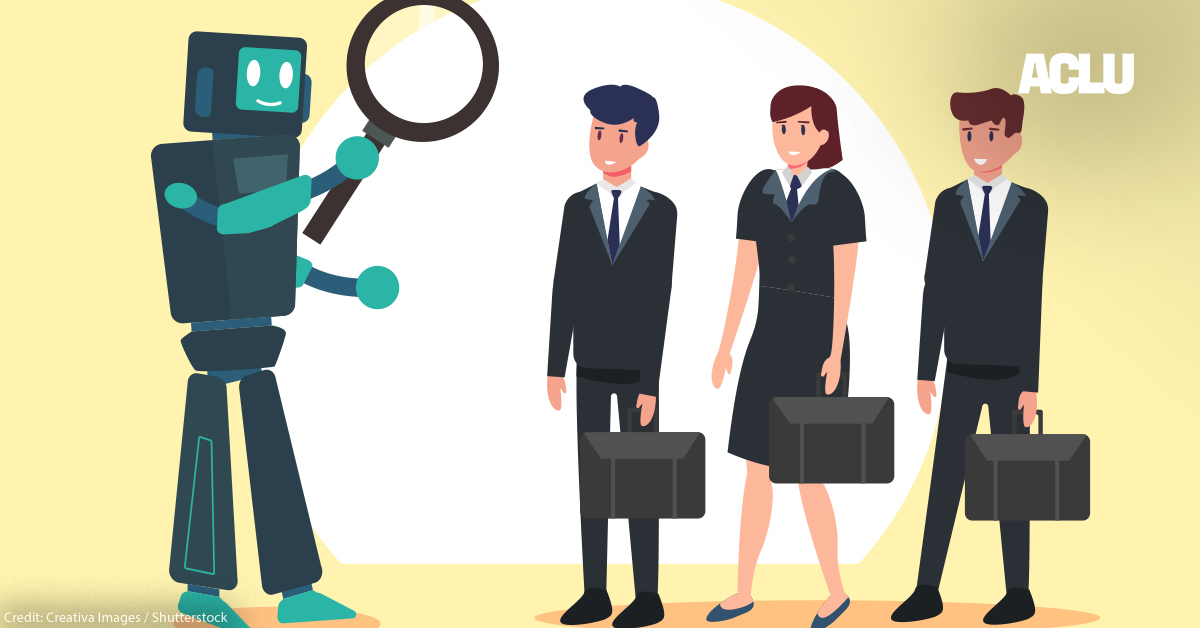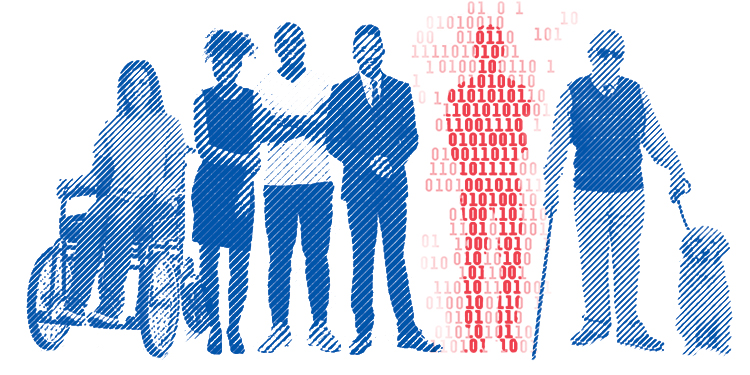The Long History of Discrimination in Job Hiring Assessments


Applying for jobs can be a difficult and frustrating experience: youÔÇÖre putting forward your qualifications to be judged by a prospective employer. We all want to be treated fairly. We want our qualifications to speak for themselves. But for job seekers who have been historically excluded or discriminated against because of their race, gender identity, or disability, there can be another question lurking in the background: Am I being judged, not for my ability to do the job, but for my identity?
Automated decision-making tools, including those using artificial intelligence, or AI, and algorithms, have been widely adopted in hiring. Today seven out of 10 employers use them. We have previously written about AI and some of the newer ways that itÔÇÖs impacting hiring, including how it lacks transparency and can harbor serious flaws that lead to bias and discrimination. But these tools are just the latest frontier in a long history of employment tests that can discriminate and harm job seekers. For example, one of the landmark civil rights cases, , was about a companyÔÇÖs use of bogus tests to .

How Artificial Intelligence Might Prevent You From Getting Hired
AI-based tools are used throughout hiring processes, increasing the odds of discrimination in the workplace.
Source: └¤░─├┼┐¬¢▒¢ß╣¹
When tests and tools that have a long history of problems are combined with new technologies like AI, risks of harm only increase, exacerbating harmful barriers to employment based on race, gender, disability, and other protected characteristics. While the harm of racial discrimination in employment tests has long been recognized and challenged, there has been less awareness about how these tests impact applicants who, in addition to facing racial discrimination, face discrimination based on their disabilities.
The use of personality assessments in hiring processes has become increasingly common. Yet these tests often ask general questions that may have little to do with the ability to do the job and capture traits that are directly linked with characteristics commonly associated with autism and mental health conditions such as depression and anxiety. This creates a high risk that qualified workers with these disabilities will be disadvantaged compared to other workers and may be unfairly and illegally screened out.

Know Your Rights | Know Your Digital Rights: Digital Discrimination in Hiring
Equal access to job opportunities is a core component of economic justice. Increasingly, employers are using automated tools in their hiring...
Source: └¤░─├┼┐¬¢▒¢ß╣¹
To push back, we filed a complaint to the Federal Trade Commission (FTC) against Aon, a major hiring technology vendor, alleging that Aon is deceptively marketing widely used online hiring tests as ÔÇ£bias-freeÔÇØ even though the tests discriminate against job seekers based on traits like their race or disability. The └¤░─├┼┐¬¢▒¢ß╣¹ and co-counsel have also filed charges with the Equal Employment Opportunity Commission (EEOC) against both Aon and an employer that uses AonÔÇÖs assessments on behalf of a biracial (Black/white) autistic job applicant who was required to take Aon assessments as part of the employerÔÇÖs hiring process.
Two Aon products, a ÔÇ£personalityÔÇØ assessment test and its automated video interviewing tool, which integrate algorithmic or AI-related features, are marketed to employers across industries as cost-effective, efficient, and less discriminatory than traditional methods of assessing workers and applicants. However, these products assess very general personality traits such as positivity, emotional awareness, liveliness, ambition, and drive that are not clearly job related or necessary for a specific job and can unfairly screen out people based on disabilities. The automated features of these tools exacerbate these fundamental problems, particularly as Aon incorporated artificial intelligence elements in its video interviewing tool that are also likely to discriminate based on disability, race, and other protected characteristics.
Cognitive ability assessments, another staple in hiring, must also be subject to scrutiny, as they have long been shown to disadvantage Black job candidates and other candidates of color and may also unfairly exclude individuals based on disability. These tests, touted to measure aspects of memory, as well as several others it markets, have racial disparities in performance.
For autistic and other neurodivergent job applicants and applicants of color, cognitive ability assessments pose a significant barrier to employment. Not only do they fail to accommodate diverse needs, but they also perpetuate discrimination based on race, disability, and other traits. Employers should not use assessments that carry a high risk of discrimination. Employers risk screening out people who could be successful employees, impacting diversity in the workplace, and could face legal liability, even where the assessments are designed and administered by third-party vendors. Employers have a legal obligation to thoroughly vet any assessments they use for compliance with anti-discrimination laws, and if they decide to use an assessment, they must provide meaningful notice so that disabled workers can make an informed choice whether to seek accommodations or alternative processes.
But vendors must also be accountable for the tools they market. Employers can hold vendors accountable by demanding that vendors truly design their products to be inclusive ÔÇô including by incorporating the perspectives and experiences of people with disabilities and other protected groups into their design process -- and conduct thorough auditing for discrimination based on race, disability and other protected characteristics. They can also demand transparency and decline to purchase their products if they fail to do so. And vendors can and should also be held legally accountable for their discriminatory products and deceptively marketing them. As the EEOC recently in a federal case about discrimination in an online hiring product, vendors can be held accountable under employment discrimination laws, and our FTC complaint should serve as notice to vendors that we will seek to hold them accountable under consumer protection laws as well.
As the hiring landscape continues to change and job applicants face new hiring tools, we must strive for a future where skills and potential, not bias, determines our opportunities. The └¤░─├┼┐¬¢▒¢ß╣¹ stands ready to defend the rights of individuals wronged by discriminatory practices. Together, we can dismantle discriminatory barriers and build a more inclusive workforce for all.

